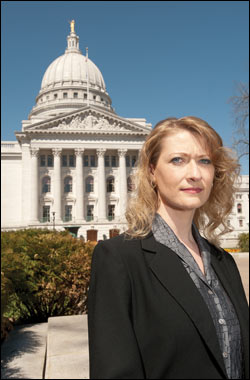Petition seeks to remove victims’ names from some court filings
By: Eric Heisig//January 29, 2014//

Supporters of a measure to disallow the use of names of crime victims in appellate paperwork say it is a step toward ensuring victims’ ordeals don’t haunt them forever.
The petition for a state Supreme Court rule change seeks to disallow attorneys, judges and justices from using full names in briefs, appellate opinions and Supreme Court opinions. As introduced by Wisconsin Judicial Council attorney April Southwick on Jan. 21, it calls for using initials or another pseudonym, instead.
“The ease of access and the likelihood of accidental discovery of potentially very personal information warrants increased sensitivity regarding information that the court published on the Internet,” states the memo filed in support of the petition.
The only exception to this rule would be for homicide victims, as the rule explains that “the privacy issues addressed by the rule do not extend to a deceased victim.”
The petition has been in the works since 2011. The council, which is made up of a mix of prosecutors, legislators and judges, approved it in October.
If approved by the justices, it would not effect any filings on the circuit or county court levels, or any appellate opinions and briefs already filed.
Southwick and Jill Karofsky, director of the Attorney General’s Office of Crime Victim Services and a member of the council committee that studied the issue, both said the change most likely would benefit victims of sexual assault or domestic violence.
Karofsky said the idea came from calls the Department of Justice received from victims that were suicidal.
“One victim in particular, who had a unique first name and unique last name, had a hard time finding a job,” Karofsky explained, saying that an employer searched that victim’s name and found an appeals court decision that outlined her sexual assault case.
The appeal, Karofsky said, had “nothing to do with the crime itself.”
“It could have been any criminal case with any set of facts at all,” she said. “In this particular case, it had both facts of the case and quite a bit about her sexual assault.”
Southwick also pointed out that Wisconsin Circuit Court Access, which is commonly referred to as CCAP — Consolidated Court Automation Programs – already prohibits clerks from putting victims’ names on its website.
“This isn’t something that requires removing information,” Southwick said. “This just says that at time that you are writing the brief and opinion, don’t put it in there.
“At the appellate stage, very, very rarely is the victim’s name relevant to the issue that’s on appeal.”
The measure has the support of a handful of defense attorneys and victims’ rights associations, which each weighed in during the petition drafting process.
“Victims of sensitive crime in particular often face trauma and heartache that extends far beyond the initial crime,” Tony Gibart, public policy coordinator for the Wisconsin Coalition Against Domestic Violence, said. “Privacy is a significant concern. This is a rule petition that really takes some steps to protect their privacy in some simple ways.”
Bob Dreps, a media law attorney for Godfrey & Kahn SC, said the idea itself didn’t appear to be problematic, but he questioned the need for a change, given that the information still is readily available in circuit court case paperwork.
“It strikes me as too little too late, unfortunately,” Dreps said. “For anybody to be a victim of a crime, I don’t think there’s any shame in it. But if the crime’s newsworthy, it’s already public information by the time it gets to an appellate court.”
Still, Karofsky and Southwick said, the problem is that a filing that can be found on Google lives for a long time. In rural areas of the state, where most residents know each other, stumbling across an opinion can be detrimental.
“It’s hard with the Internet,” Karofsky said. “It takes that small town problem and it makes it global.”
The justices are expected to consider the petition at both a public hearing and an open rules conference. No dates have yet been set. Follow @eheisigWLJ
Legal News
- A conservative quest to limit diversity programs gains momentum in states
- Wisconsin prison inmate pleads not guilty to killing cellmate
- Waukesha man sentenced to 30 years for Sex Trafficking
- 12-year-old shot in Milwaukee Wednesday with ‘serious injuries’
- Milwaukee man convicted of laundering proceeds of business email compromise fraud schemes
- Giuliani, Meadows among 18 indicted in Arizona fake electors case
- Some State Bar diversity participants walk away from program
- Wisconsin court issues arrest warrant ‘in error’ for Minocqua Brewing owner
- Iranian nationals charged cyber campaign targeting U.S. Companies
- Facing mostly white juries, are Milwaukee County defendants of color truly judged by their peers?
- Milwaukee Mayor speaks in D.C. Tuesday at White House water summit
- Chicago man sentenced to prison after being caught with ‘Trump Gun’
WLJ People
- Power 30 Personal Injury Attorneys – Russell Nicolet
- Power 30 Personal Injury Attorneys – Benjamin Nicolet
- Power 30 Personal Injury Attorneys – Dustin T. Woehl
- Power 30 Personal Injury Attorneys – Katherine Metzger
- Power 30 Personal Injury Attorneys – Joseph Ryan
- Power 30 Personal Injury Attorneys – James M. Ryan
- Power 30 Personal Injury Attorneys – Dana Wachs
- Power 30 Personal Injury Attorneys – Mark L. Thomsen
- Power 30 Personal Injury Attorneys – Matthew Lein
- Power 30 Personal Injury Attorneys – Jeffrey A. Pitman
- Power 30 Personal Injury Attorneys – William Pemberton
- Power 30 Personal Injury Attorneys – Howard S. Sicula











